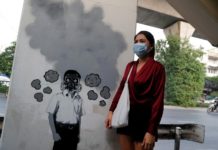Sloppy facemask disposal and poor hygiene awareness is set to create a new, more powerful, COVID surge across Thailand.
People have recently been forced to wear facemasks in most Thai provinces, despite the overwhelming medical evidence that they do not prevent the spread of viruses and, in fact, do more harm to people’s health that good.
The risk of further spreading is a good example of this.
The move has left the public wondering who is making these simple-minded decisions and what on earth are they thinking.
Especially now as it looks likely COVID face-muzzles, or at least the lazy disposal of, are actually causing further spreading of the mild virus and not reducing it.
An estimated 1.8 billion face masks are being discarded nationwide each day, many of them improperly, raising fears among medics of a further spread of Covid-19.
The Department of Pollution Control (DPD) is in discussion with the Bangkok Metropolitan Administration (BMA) and other provinces to encourage residents to follow correct disposal guidelines, which prioritise garbage separation.
The authorities have found an increasing number of used face masks being thrown away with normal household garbage, said DPD director-general Atthapol Charoenchansa.
Discarded masks that are tainted with infection expose garbage collectors to a high risk of contracting Covid-19 and further spreading the disease. (continues)
From June 1 to Dec 31 last year, 17.8 tonnes of face masks were collected from 2,690 locations nationwide, according to DPD figures.
Most were disposed of properly by local authorities while the rest were buried in landfills, incinerated or taken care of by private contractors.
The DPD says the amount of discarded face masks is set to jump dramatically this year.
If everyone in Thailand throws away one mask a day, the amount of monthly discarded masks will exceed 1.8 billion.
Bangkok alone produces more than 20 tonnes of infected garbage a day, mostly discarded face masks picked up from hospitals treating Covid-19 patients, and field hospitals where mild-symptom Covid sufferers are treated.
Mr Atthapol said infected garbage discharged from hospitals and medical facilities present no problem to the environment or people because it is disposed of in a safe, closed system — the department was more concerned about people neglecting to separate used masks from other everyday household garbage.
He suggested a special bin be set aside for used masks. People should also fold the masks in half and tighten them with a string before dropping them into the bin. Every 3-4 days the masks should be gathered and placed inside a plastic bag with the opening tightened with a string.
Then the bag should be clearly labelled as infected garbage.










































